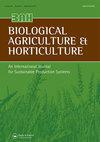Orchard management practices affect arbuscular mycorrhizal fungal root colonisation of almond
IF 1.6
4区 农林科学
Q3 AGRONOMY
引用次数: 7
Abstract
ABSTRACT Arbuscular mycorrhizal fungi (AMF) are mutualistic fungi that play important roles in plant nutrition and soil ecosystem functions. While AMF are known to benefit diverse host plants under a range of conditions, little is known about their presence in commercial almond orchards and how frequently used management practices regulate AMF root colonisation. A large-scale survey of almond orchards in the Central Valley of California was conducted to determine the extent of mycorrhizal associations with roots and the impact of orchard management practices and soil properties on AMF root colonisation rates. The roots in all orchards were colonised, with an overall average rate of 64.4%. Organically managed orchards had higher AMF root colonisation rates (73.2%) as compared with conventionally managed orchards (62.1%), primarily due to the presence of soil vegetative cover rather than organic matter inputs. Choice of rootstock and fumigation had only marginal effects while inoculation at planting increased AMF root colonisation of young trees by 27% compared to non-inoculated control. These results highlighted the ubiquitous presence of AMF in commercial almond orchards and significant interacting influences of common management practices on AMF root colonisation under field conditions. Further research into the functional implications of mycorrhizal associations in these orchards will help guide the development of management practices that increase AMF abundance and root colonisation to improve the sustainability of this rapidly expanding industry.果园管理措施对杏树丛枝菌根真菌定殖的影响
丛枝菌根真菌(AMF)是一种互惠共生真菌,在植物营养和土壤生态系统功能中起着重要作用。虽然已知AMF在一系列条件下对不同的寄主植物有益,但对它们在商业杏仁果园中的存在以及使用管理措施调节AMF根定殖的频率知之甚少。对加利福尼亚中央山谷的杏仁果园进行了大规模调查,以确定菌根与根的联系程度,以及果园管理措施和土壤性质对AMF根定殖率的影响。所有果园的根都有定植,总体平均率为64.4%。有机管理果园的AMF根定殖率(73.2%)高于常规管理果园(62.1%),这主要是由于土壤植被覆盖而不是有机质投入。砧木的选择和熏蒸只有边际效应,而种植时接种AMF使幼树的根定植比未接种的对照增加27%。这些结果强调了AMF在商业杏仁果园中的普遍存在,以及在田间条件下,常见管理措施对AMF根定殖的显著相互作用影响。进一步研究这些果园中菌根关联的功能含义将有助于指导管理实践的发展,从而增加AMF的丰度和根定殖,从而提高这一迅速发展的产业的可持续性。
本文章由计算机程序翻译,如有差异,请以英文原文为准。
求助全文
约1分钟内获得全文
求助全文
来源期刊
CiteScore
3.30
自引率
6.70%
发文量
18
审稿时长
>36 weeks
期刊介绍:
Biological Agriculture & Horticulture aims to act as the central focus for a wide range of studies into alternative systems of husbandry, and particularly the biological or organic approach to food production. The Journal publishes work of a sound scientific or economic nature related to any aspect of biological husbandry in agriculture, horticulture and forestry in both temperate and tropical conditions, including energy and water utilization, and environmental impact.

 求助内容:
求助内容: 应助结果提醒方式:
应助结果提醒方式:


